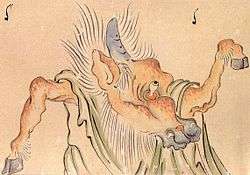
Baka (word)
Baka (馬鹿, ばか, or バカ) means "fool; idiot", or (as an adjectival noun) "foolish" and is the most frequently used pejorative term in the Japanese language. This word baka has a long history, an uncertain etymology (possibly from Sanskrit or Classical Chinese), and linguistic complexities.
Word
The modern Japanese writing system transcribes the insult baka as バカ in katakana, ばか in hiragana, or 馬鹿 (lit. "horse deer") in ateji phonetic kanji transcription; earlier ateji renderings included 莫迦, 母嫁, 馬嫁, or 破家.
History
The first written usages of baka were during the Nanboku-chō period (1336–1392), when the "Northern and Southern Courts" battled.
In the earliest example, the Taiheiki historical epic records bakamono 馬鹿者 being used as an insult in 1342. The Ashikaga commander Toki Yoritō 土岐頼遠 refuses to pay obeisance to retired Emperor Kōgon (r. 1313-1364), "Yoritō, probably inebriated, loudly demands to know what kind of fool (bakamono) has the temerity to order him to dismount." According to Carr, "Shinmura found that the original editions (fourteenth century) of the Taiheiki had baka written バカ; [while] later movable-type editions (c. 1600) had the characters 馬鹿."

Baka people (Cameroon and Gabon)
The Baka people, known in the Congo as Bayaka (Bebayaka, Bebayaga, Bibaya), are an ethnic group inhabiting the southeastern rain forests of Cameroon, northern Republic of Congo, northern Gabon, and southwestern Central African Republic. They are sometimes called a subgroup of the Twa, but the two peoples are not closely related. Likewise, the name "Baka" is sometimes mistakenly applied to other peoples of the area who, like the Baka and Twa, have been historically called pygmies, a term that is no longer considered respectful.
Identity
The Baka people are hunter-gatherers, formerly called Pygmies, located in the Central African rain forest. Having heights of 1.52 meters (5 feet) in average as well as a semi-nomadic lifestyles, the Baka are often discriminated against and marginalized from society.
They reside in south-eastern Cameroon, northern Gabon and in the northern part of the Democratic Republic of Congo. In Congo, the Baka people are otherwise known as the Bayaka. Some Baka are also found in the Southwestern African Republic. Although, the Baka people are located throughout the Central African rain forest, they are mainly concentrated in Cameroon as the Baka community of Cameroon represents roughly 30 000 individuals.
BAKA
The Bahagian Agama dan Kaunseling (Religious And Counselling Division) or BAKA is the Muslim chaplain service of the Royal Malaysian Police.
External links

Departure (Jesse McCartney album)
Departure is the third studio album by American recording artist Jesse McCartney. It was released on May 20, 2008 through Hollywood Records. The album was re-released on April 7, 2009, under the name Departure: Recharged. The album featured a heavier R&B sound, and spawned three US Hot 100 top 40 hits, "Leavin'", "How Do You Sleep?", and "Body Language". The latter two were released as singles from the recharged edition.
Album information
It has been described by McCartney as a complete change in musical style compared to his previous releases. About the new album, he said, "I'm shooting for Prince chord changes, Michael [Jackson] melodies, and the bigness of Madonna - fun '80s stuff. That's the best that I can put it". Producers on the album include Tricky Stewart, The-Dream, Sean Garrett, The Clutch, Brian Kennedy, and J. R. Rotem.
The album leaked April 30, 2008, almost three weeks before the release date. Departure was released one week early on the Canadian iTunes Store. The CD was released using CDVU+ technology. Some countries, including the UK and Brazil, were excluded from the recycled packaging and CDVU+ Software on the release.
Departure (1931 film)
Departure (French:Partir) is a 1931 French drama film directed by Maurice Tourneur and starring Jean Marchat, Simone Cerdan and Ginette d'Yd. It was based on a novel by Roland Dorgelès. An opera singer travelling with her company on a passenger ship for a tour of French Indochina, encounters a mysterious young man who she falls in love with.
Cast
References
Bibliography
External links
Departure (1986 film)
Departure is a 1986 Australian film directed by Brian Kavanagh.
Plot
A married couple decide to move to Rome and spend a final weekend in Australia.
Production
It was shot in Hobart and Richmond in Tasmania and only received a limited release.
References
External links

Song
A song is a single (and often standalone) work of music intended to be sung by the human voice with distinct and fixed pitches and patterns using sound and silence and a variety of forms that often include the repetition of sections. Written words created specifically for music or for which music is specifically created, are called lyrics. If a pre-existing poem is set to composed music in classical music it is an art song. Songs that are sung on repeated pitches without distinct contours and patterns that rise and fall are called chants. Songs in a simple style that are learned informally are often referred to as folk songs. Songs that are composed for professional singers are called popular songs. These songs, which have broad appeal, are often composed by professional songwriters, composers and lyricists. Art songs are composed by trained classical composers for concert performances. Songs are performed live and recorded. Songs may also appear in plays, musical theatre, stage shows of any form, and within operas.
Podcasts:

